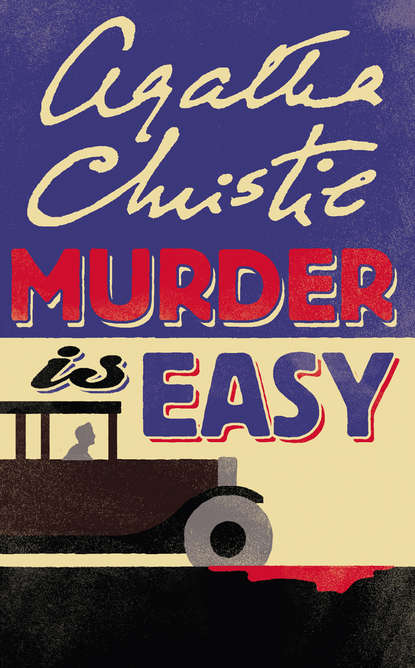‘No—I don’t know of anything of that kind.’
‘There’s the child superstition, of course,’ said Luke. ‘Death of a boy child—a violent death that is—the boy always walks. Not a girl child—interesting that.’
‘Very,’ said Mr Abbot. ‘I never heard that before.’
Since Luke had just invented it, that was hardly surprising.
‘Seems there’s a boy here—Tommy something—was in your office at one time. I’ve reason to believe they think that he’s walking.’
Mr Abbot’s red face turned slightly purple.
‘Tommy Pierce? A good for nothing, prying, meddlesome jackanapes.’
‘Spirits always seem to be mischievous. Good law-abiding citizens seldom trouble this world after they’ve left it.’
‘Who’s seen him—what’s this story?’
‘These things are difficult to pin down,’ said Luke. ‘People won’t come out into the open with a statement. It’s just in the air, so to speak.’
‘Yes—yes, I suppose so.’
Luke changed the subject adroitly.
‘The real person to get hold of is the local doctor. They hear a lot in the poorer cases they attend. All sorts of superstitions and charms—probably love philtres and all the rest of it.’
‘You must get on to Thomas. Good fellow, Thomas, thoroughly up-to-date man. Not like poor old Humbleby.’
‘Bit of a reactionary, wasn’t he?’
‘Absolutely pig-headed—a diehard of the worst description.’
‘You had a real row over the water scheme, didn’t you?’ asked Bridget.
Again a rich ruddy glow suffused Abbot’s face.
‘Humbleby stood dead in the way of progress,’ he said sharply. ‘He held out against the scheme! He was pretty rude, too, in what he said. Didn’t mince his words. Some of the things he said to me were positively actionable.’
Bridget murmured: ‘But lawyers never go to law, do they? They know better.’
Abbot laughed immoderately. His anger subsided as quickly as it had arisen.
‘Pretty good, Miss Bridget! And you’re not far wrong. We who are in it know too much about law, ha, ha. Well, I must be getting along. Give me a call if you think I can help you in any way, Mr—er—’
‘Fitzwilliam,’ said Luke. ‘Thanks, I will.’
As they walked on Bridget said:
‘Your methods, I note, are to make statements and see what they provoke.’
‘My methods,’ said Luke, ‘are not strictly truthful, if that is what you mean?’
‘I’ve noticed that.’
A little uneasy, he hesitated what to say next. But before he could speak, she said:
‘If you want to hear more about Amy Gibbs, I can take you to someone who could help you.’
‘Who is that?’
‘A Miss Waynflete. Amy went there after she left the Manor. She was there when she died.’
‘Oh, I see—’ he was a little taken aback. ‘Well—thank you very much.’
‘She lives just here.’
They were crossing the village green. Inclining her head in the direction of the big Georgian house that Luke had noticed the day before, Bridget said: ‘That’s Wych Hall. It’s a library now.’
Adjoining the Hall was a little house that looked rather like a doll’s house in proportion. Its steps were dazzlingly white, its knocker shone and its window curtains showed white and prim.
Bridget pushed open the gate and advanced to the steps.
As she did so the front door opened and an elderly woman came out.
She was, Luke thought, completely the country spinster. Her thin form was neatly dressed in a tweed coat and skirt and she wore a grey silk blouse with a cairngorm brooch. Her hat, a conscientious felt, sat squarely upon her well-shaped head. Her face was pleasant and her eyes, through their pince-nez, decidedly intelligent. She reminded Luke of those nimble black goats that one sees in Greece. Her eyes held just that quality of mild inquiring surprise.
‘Good morning, Miss Waynflete,’ said Bridget. ‘This is Mr Fitzwilliam.’ Luke bowed. ‘He’s writing a book—about deaths and village customs and general gruesomeness.’
‘Oh, dear,’ said Miss Waynflete. ‘How very interesting.’
And she beamed encouragingly upon him.
He was reminded of Miss Pinkerton.
‘I thought,’ said Bridget—and again he noted that curious flat tone in her voice—‘that you might tell him something about Amy.’
‘Oh,’ said Miss Waynflete. ‘About Amy? Yes. About Amy Gibbs.’
He was conscious of a new factor in her expression. She seemed to be thoughtfully summing him up.
Then, as though coming to a decision, she drew back into the hall.
‘Do come in,’ she said. ‘I can go out later. No, no,’ in answer to a protest from Luke. ‘I had really nothing urgent to do. Just a little unimportant domestic shopping.’
The small drawing-room was exquisitely neat and smelled faintly of burnt lavender. There were some Dresden china shepherds and shepherdesses on the mantelpiece, simpering sweetly. There were framed water-colours, two samplers, and three needlework pictures on the wall. There were some photographs of what were obviously nephews and nieces and some good furniture—a Chippendale desk, some little satinwood tables—and a hideous and rather uncomfortable Victorian sofa.
Miss Waynflete offered her guests chairs and then said apologetically:
‘I’m afraid I don’t smoke myself, so I have no cigarettes, but do please smoke if you like.’








 Рейтинг:
0
Рейтинг:
0